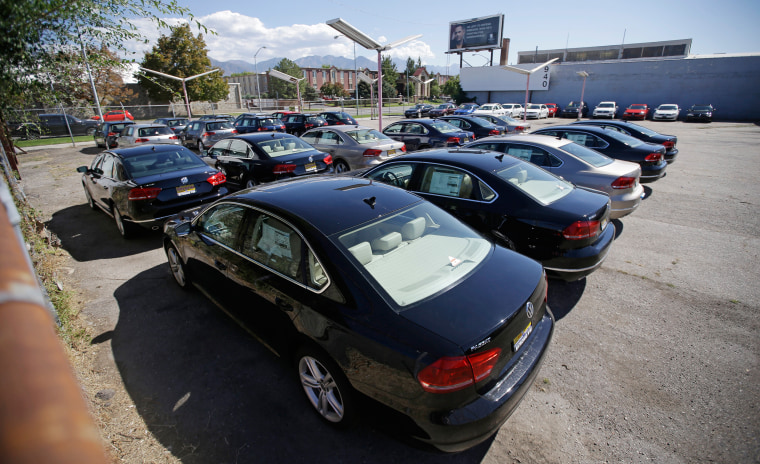For American motorists looking for sporty but environmentally friendly alternatives to sluggish hybrids, diesels like the Volkswagen Jetta TDI have been a welcome option. The ability to deliver real performance along with high mileage is one reason why diesel sales have continued to grow even as demand for gas-electric models has plunged in the face of cheap gas.
But that growth spurt is likely to sputter, in the wake of the Volkswagen cheating scandal, industry insiders warn. Last week, the Environmental Protection Agency ordered the recall of 482,000 VW diesel models in the U.S., revealing that the German automaker had used software to secretly circumvent the government’s emissions tests. In real world situations, vehicles like the Jetta TDI actually produce up to 40 times the permissible level of noxious emissions.
“This is another black eye for diesels,” said Mike Jackson, CEO of Florida-based AutoNation, the country’s largest automotive retailer. “You now have a passionate constituency that feels betrayed.”

If the VW mess isn’t enough, a new report from Germany indicates the government has found that at least one diesel model sold there significantly exceeds European Union emissions standards – which are generally more lax on diesels than in the U.S.
VW Scandal: Engineer's Testing 'Opened a Can of Worms' for Automaker
German officials are now calling for random roadside checks to see if other automakers secretly developed software to game the testing process.
In the late 1970s and early ‘80s, in the wake of twin Mideast oil shocks, high-mileage diesels experienced explosive growth. But the “oil burners” of that era were generally slow, noisy and foul-smelling.
As a result, the diesel market collapsed as emissions standards were ramped up. By 2007, light-duty diesel sales – excluding a handful of heavy-duty pickups – fell to just 16,700.
In Europe, however, demand was soaring as a new generation of supposedly “clean diesels” was introduced. The technologies that helped make them more environmentally friendly – such as turbocharging – also boosted performance. In some cases, these new models also delivered highway mileage equal to comparable hybrids. By the beginning of this decade, roughly half of the vehicles sold in Europe were diesel-powered.
Though American and Asian makers were reluctant to return diesels to the U.S. market, German brands rushed over an assortment of models. And sales started to take off, growing to 57,800 by 2009, and last year hitting 163,200, according to estimates from AutoPacific, Inc.
Until this week, the consulting firm was one of many to project even bigger growth as more manufacturers began to add new diesels: Fiat Chrysler scored a hit with the Ram 1500 diesel pickup, Chevrolet recently added a version of its Cruze sedan. Jaguar Land Rover is launching an array of diesel models, including the 2016 Range Rover TDI.
VW Had Previous Run-In With U.S. Regulators Over 'Defeat Devices'
But such plans have been jeopardized by the VW scandal, warned AutoPacific’s Ed Kim.
“The potential impact puts years of effort and millions of dollars of investments to waste,” he said.
With Volkswagen ordering at least a temporary hold on U.S. sales of its four-cylinder diesel models – which last year accounted for a quarter of its sales here – the numbers will take an immediate plunge, Kim said. But he doesn’t forecast much of a rebound, at least not initially.
AutoNation’s Jackson agrees, fearing potential buyers will now be reluctant to trust any manufacturer’s clean diesel claims.
During a Wednesday web conference, officials from the Washington, D.C.-based Diesel Technology Forum attempted to put a more positive spin on the crisis. A statement from the industry trade group argued that, “The circumstances involving a single manufacturer do not define an entire technology, or an industry. Vehicle manufacturers and engine makers have invested billions of dollars in research and development to successfully meet the most aggressive emissions standards in the world.”
But whether American motorists really will differentiate between brands is far from certain. And the situation would likely get only worse for diesel makers and proponents if BMW – or any other manufacturer – also proves to be missing those emissions standards.
Adding further downward pressure, petroleum prices are continuing to slide even as automakers introduce new gas-powered models that are getting better and better mileage, also without much sacrifice in performance.
Add it all up, said analyst Kim, “and this is going to push diesels back quite a few years.”
More from The Detroit Bureau
Justice Department Launching VW Probe